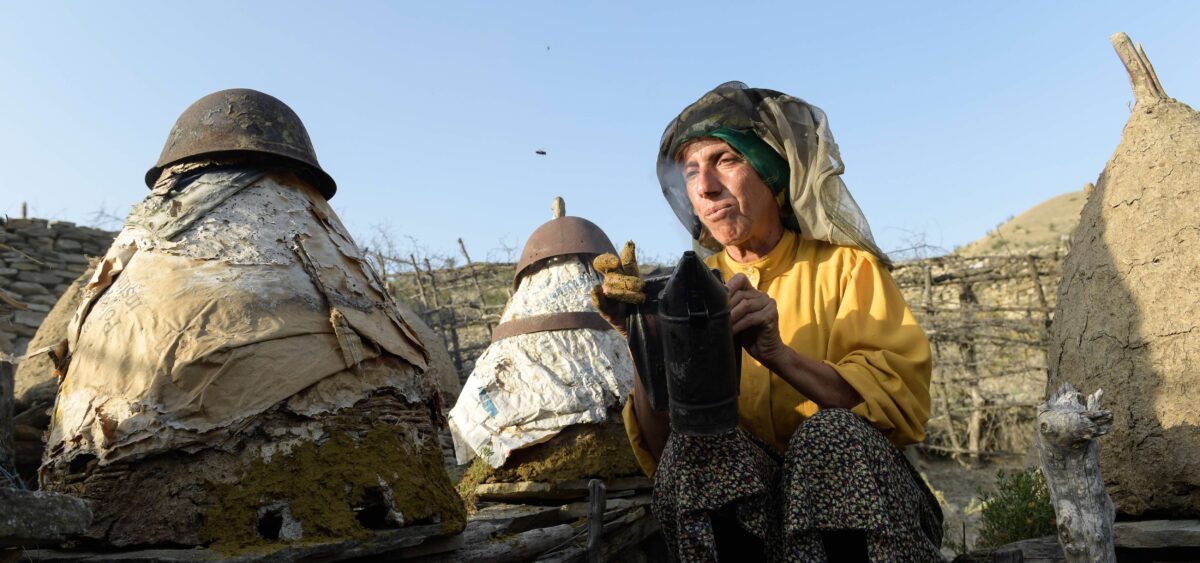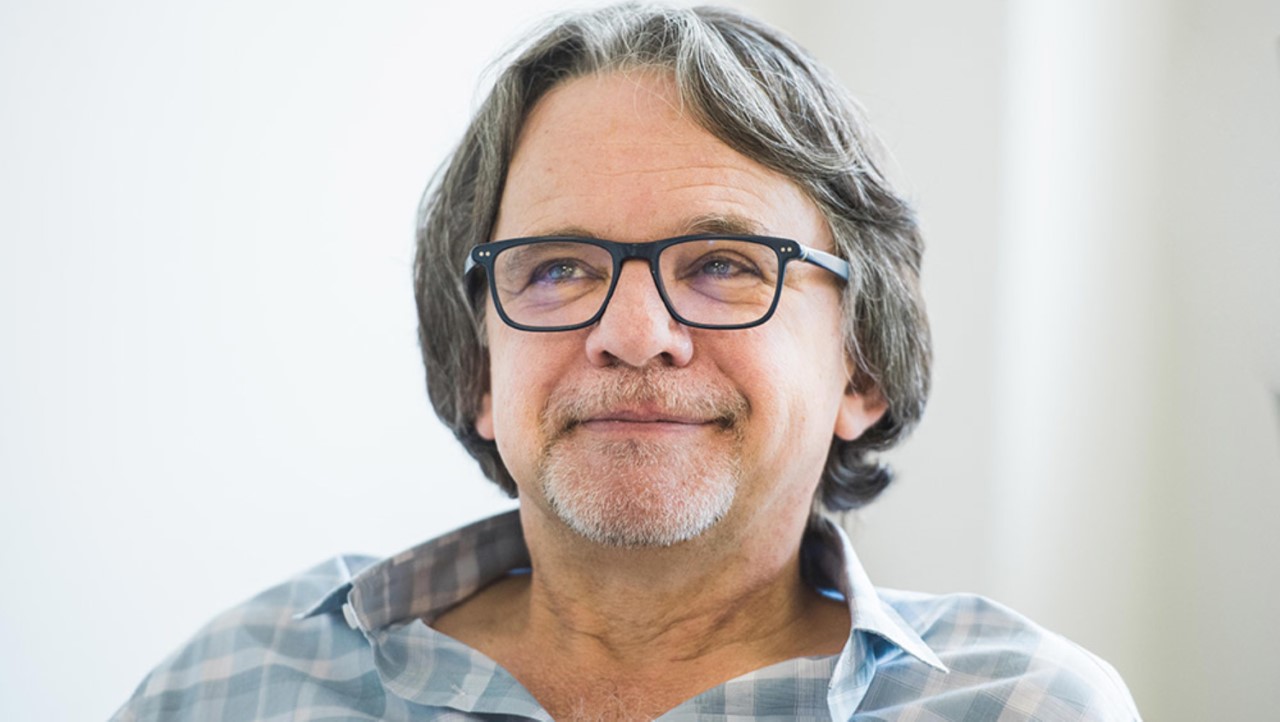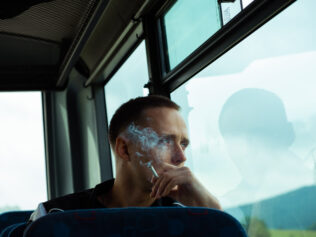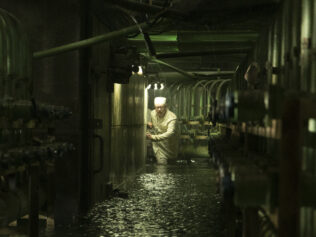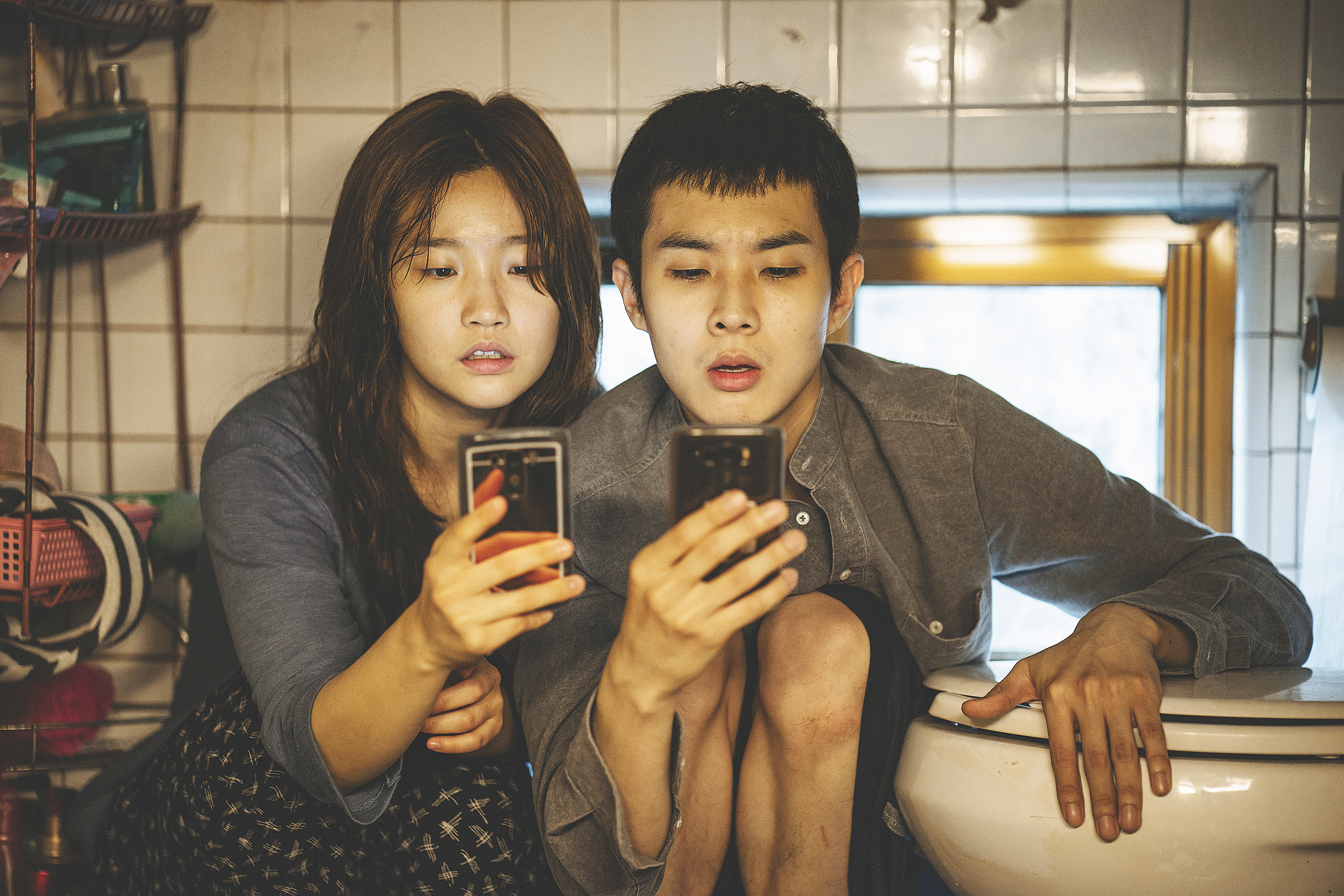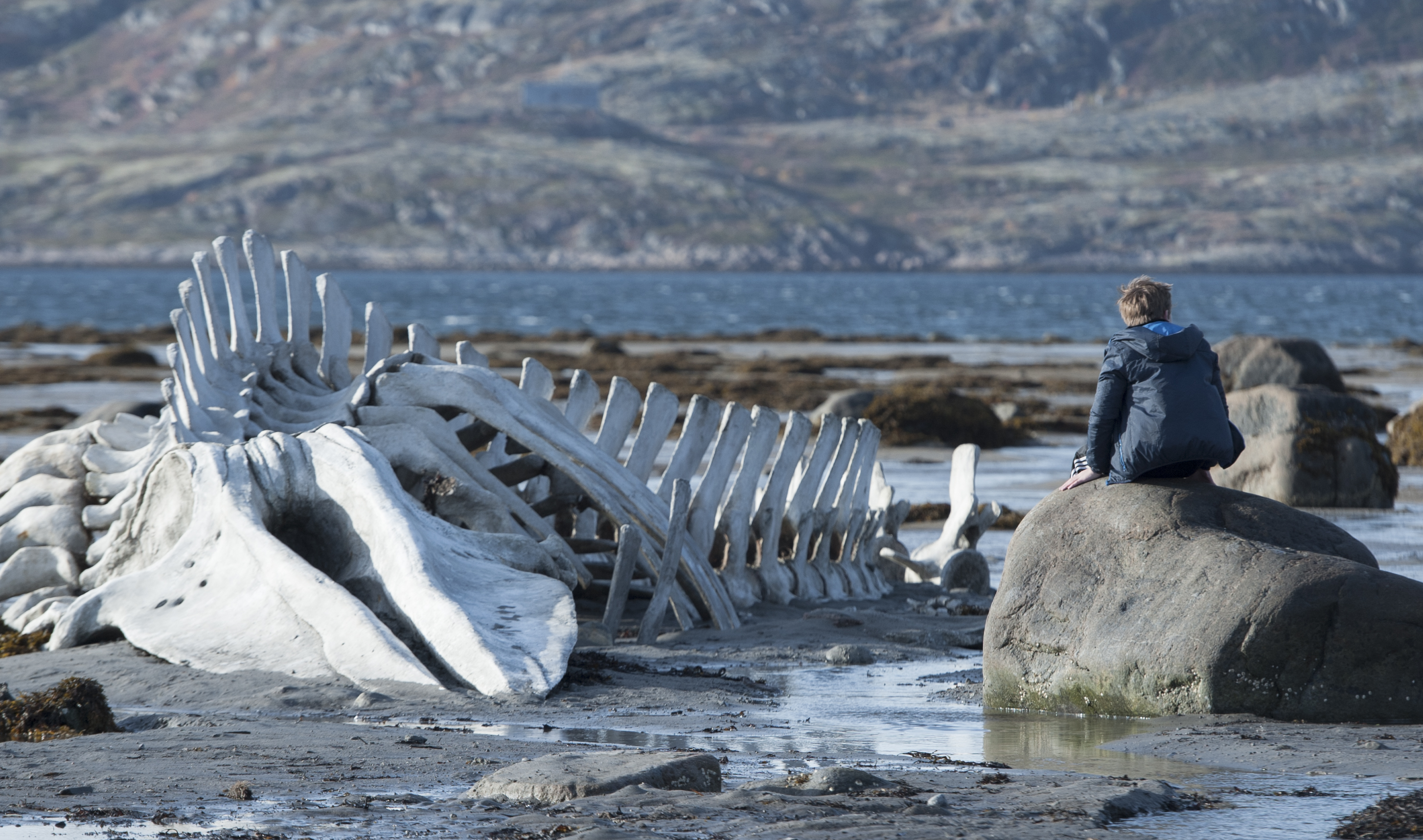
“I’ve never experienced anything like this in my life. We went there for the first time and it already felt like we knew her all our lives. And for me this was a process of growing up to be a better human being.” Dariusz Kuźma talks candidly with Fejmi Daut and Samir Ljuma, the cinematographers of Honeyland – one of the most discussed documentary films of 2019 and currently shortlisted for two Academy Awards.
Dariusz Kuźma: I know that Honeyland started as a commissioned project – you were hired to shoot a short documentary dedicated to nature conservation. How did it evolve into a poignant feature about forgotten ways of beekeeping and different shades of being human?
Fejmi Daut: This abandoned village you see on the screen, Bekirlijia, is located more or less in the middle of North Macedonia, near the Bregalnica river, in a strikingly beautiful area that is basically forgotten by almost everyone. Time flows differently there. While we were doing research with directors Ljubomir Stefanov and Tamara Kotevska for the short documentary you mentioned, we heard about an old Turkish family living there, in seclusion from the rest of the world, keeping bees in an almost ancient way. We decided to go there and meet with these people; find some interesting and fresh ideas for our project.
And then you met Hatidze, this wild beekeeper and a beautiful human being who stays with her sick mother in a world that should not exist by modern standards, living almost exclusively on what she gets from her symbiotic relationship with the surrounding nature.
Fejmi Daut: There was an instant connection the minute we met her. All our lives we had been searching for a character like her!
Samir Ljuma: I remember that day, I was so excited, I wanted to start shooting immediately. Even though the village was difficult to reach – you know, we didn’t have any terrain vehicle and we basically weren’t prepared for such a journey – we soon found ourselves doing everything to stay with Hatidze. The project took us three years to complete, but it was worth it.
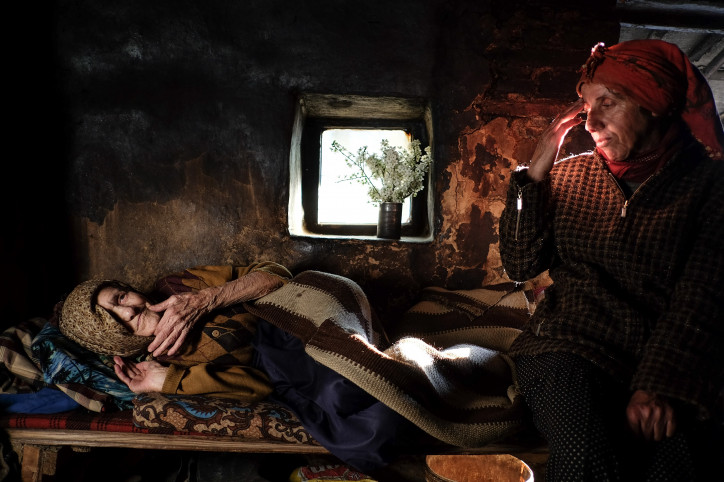
I assume it took that long because of the evolving situation of Hatidze and her mother, whose lives were basically invaded by a large family moving in next door, and ultimately presenting a completely different attitude towards beekeeping?
Fejmi Daut: That too, but it was mainly due to Hatidze’s beekeeping methods. Because we still wanted to make nature conservation a part of this new documentary, we had to get acquainted with her cycles and processes. Which was a process in itself. Basically, every time we went there to shoot, she told us: “Now you will experience something meaningful about beekeeping.”
Samir Ljuma: She was always revealing something that we wanted to capture on camera. Like, I remember that one time she told us about a rock on the top of some mountain with a beehive deep within it, which, during the summer months when it’s very hot, leaks the most amazing honey. She couldn’t reach it with us because she was weak after an accident with a dog, and you needed a rope to get to this place, but we went to another hidden beehive, encased between two rocks. And she really collected a pot of honey from it. I couldn’t believe how this thing was still standing!
From the opening scene, in which you traverse a steep mountainside, it looks like the shoot was quite adventurous and dangerous. Was it?
Samir Ljuma: It definitely was. We struggled with positioning the camera and shooting coverage all the time. These opening shots you mentioned, we didn’t have any kind of security there – no ropes, no equipment. We just had to follow Hatidze if we didn’t want to lose her. For her it’s all natural and she can be quite carefree about it, but for us this was quite difficult. I mean, it was very steep, like, if you slipped, you would fall down 100 metres, or even more.
Fejmi Daut: She has the same attitude with the bees, you know. She doesn’t care if she is going to be stung or not. I was lucky enough to escape from the bees on that mountain, but they did sting me afterwards a couple of times. One time they hit a muscle, and while I could still do some work during the day, the night was pretty terrible…
I was about to ask about your experiences with Hatidze’s wild beekeeping methods…
Samir Ljuma: The experience was amazing! The way Hatidze treats the bees gave us strength and understanding – that we should forget about what we know and trust the bees. Even when there’s a possibility they can attack. Sometime later, we were documenting the activities of an organization that was preparing new beekeepers. There was this big event for the press to present how everything works, show how bees produce honey. They gave me a beekeeper’s protection suit, but it was very hot and I thought: I was filming with Hatidze without anything like that, why do it now? It was a brave but ill-advised decision. I was stung twice in the head. Luckily, I was not allergic, but this could have ended badly for me. I realized then how lucky we were during filming with Hatidze – if anything had happened, we’d have had to go for over three hours by car to get from the village to Skopje and find a hospital. We acquired some anti-allergic medicines then to put in our kit.
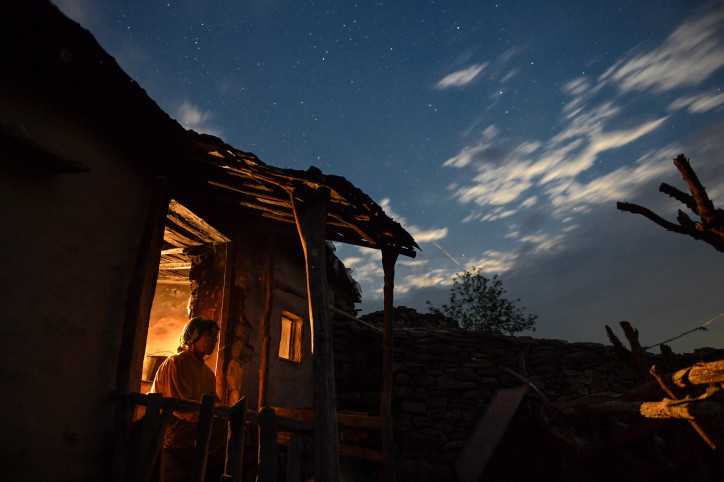
Honeyland gives a wonderful sense of living in co-dependence with nature, of which most city dwellers know nothing about. I wonder, how you – as Westerners, cinematographers working on corporate videos – perceived Hatidze and earned her trust?
Samir Ljuma: She loves people, simple as that, but because her village has been abandoned for 40 or 50 years, she didn’t have much of a chance to interact with human beings. She grew up in that village, when it was still inhabited by many people, and spent her life together with parents. I remember that when we came there, she said she was always dreaming that one day a TV crew would film her working with her bees. She doesn’t have television, but dreams about human contact. She opened up, told us her story, helped us to connect with other characters. I think it’s safe to say that, we became like a family. We still are. I think I see Hatidze more often than my mother!
Fejmi Daut: I’ve never experienced anything like this in my life. We went there for the first time and it already felt like we knew her all our lives. And for me this was a process of growing up to be a better human being. I learned so much from Hatidze: how she treats the bees and other people, how she lives according to the laws of nature. We are used to cell phones, the internet, all those things that are a part of ‘the modern way of living’, but she doesn’t have anything like that. She has an old cell phone, but if she wants to call anyone she must climb one of the steep hills to get a network connection. She has to travel to the city to sell some of her supplies and buy some necessary things. But she is completely happy with what she has. That makes you think.
Honeyland is a conscious effort to preserve her and her lifestyle, but the truth is that her world is on the verge of extinction; in 20 years, people will probably have no idea that someone like the wild beekeeper Hatidze ever existed. Did you have that in mind while shooting the film?
Samir Ljuma: Our main urge to make this documentary was to present to the world a story nobody knew existed. Hatidze’s life is something exotic, even in North Macedonia. We were showing the film to our friends and it was eye-opening for most of them. Also, people are not aware of her method of beekeeping. And many beekeepers were shocked to see her bees survive without antibiotics. That she relies solely on maintaining a fair, symbiotic relationship with nature. She even sings to them, to attract the queen bee, and treats them with respect. That is why we kept shooting.
Fejmi Daut: But, yes, we wanted to somehow preserve the way the area exists right now. This is a forgotten part of European history. There are probably 20, 25 abandoned villages like Bekirlijia, all established by Turkish immigrants who started to come to Macedonia from the Ottoman Empire in the 15th century. It’s important not to forget about it. Hatidze’s family started living in the village 200 years ago, but even with that in mind, they are still considered Turks in our country. And she speaks five languages, including Macedonian, Turkish and a little bit of Romani! She is a citizen of Europe, we should be proud of people like her, not put them on the margins of society.
How about Hatidze’s ancient beekeeping methods? Do you think they can influence other beekeepers in how they approach and treat bees?
Samir Ljuma: I would say that the answer is: yes and no. Hatidze at one point teaches the other family that “garbage is not good for the bees,” which refers to the pollution. She lives in an abandoned area where there are no people to pollute and affect her bees. It’s entirely different outside of that area, because in our modern world we endanger bees – and ourselves! – with constant polluting in so many ways it’s hard to imagine. Purely out of greediness and a thirstiness to exploit everything. We only think about this short span of our lives, and do whatever we want. This is not the principle Hatidze follows, she always says “half for me, half for you”, and maybe this is how her work could inspire others to change their ways. To protect the bees, we have to bring nature back to our lives, which is incredibly difficult for some people to imagine.
Fejmi Daut: Which shouldn’t be the case, because the media, as well as social media, are full of stories about bees, both positive and negative. Even beekeepers who live in a forest, in the open, struggle with the constant overuse of pesticides and other chemicals used to stimulate the agriculture. Even antibiotics may not be enough to protect bees from that. Not that long ago, in Bulgaria, over 200 beehives died in one small village – only because of the pesticides.
And there are also things like destroying the Amazon for the monoculture system…
Samir Ljuma: That’s the sad fact about the way the modern world is becoming more and more ‘modern’. Even cities are less and less green, the aggressive urbanization process makes them grey and concrete. So we should not be surprised that bees have become an endangered species.
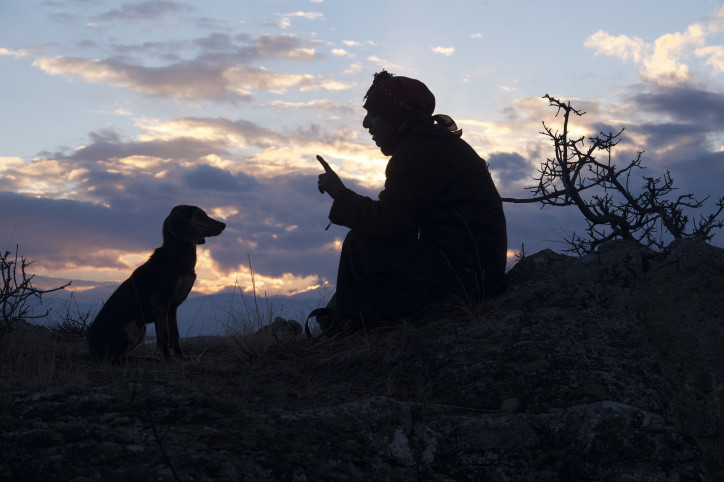
Fejmi Daut: But there is a positive change happening throughout the world, or at least in Europe. We were invited by the United Nations to screen Honeyland in Geneva, and we marvelled at their building with a beautiful garden behind it, with many beehives and proper care.
Samir Ljuma: It’s not only there. Urban beekeeping has become quite popular in recent years. When we were in Lublin, during the Millennium Docs Against Gravity film festival, we stayed at some sort of cultural centre. A very modern building, filled with art and positive vibes. And on its rooftop, there is an apiary! This urban beekeeper produces honey, organizes tours for people, and gives lectures about the importance of having bees. It was an amazing discovery. People who are educated and want to know more on the matter can shine an example for others to follow. It’s only up to us if we want to listen. And some do listen, like Hatidze’s nephew who was a shepherd, but has now sold his sheep and dedicates his time to helping her and learning about dealing with the bees. He saw that his aunt does something valuable and lives quite decently money-wise.
Fejmi Daut: In that sense, Honeyland brings a hopeful message. Even if you don’t have the time or willingness to have your own beehives, you can try to learn something about it; be more aware. And it will surprise you. I remember the first time I tasted Hatidze’s honey. It was so amazing that I can’t really enjoy any kind of mass-produced honey anymore. It’s like two different worlds.
The interview was conducted during EnergaCAMERIMAGE 2019 Film Festival.
Parts of this interview have been edited and condensed for clarity and brevity.


